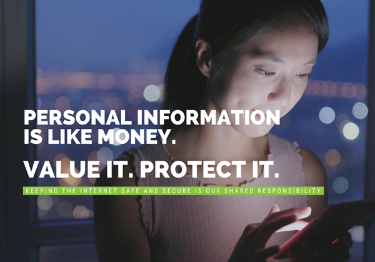Information Security Awareness
 National Cybersecurity Awareness Month may be over, but serious cyber threats continue to pursue individuals daily. Do Your Part. #BeCyberSmart. If you connect to the internet, protect yourself and your device(s) from viruses or attacks.
National Cybersecurity Awareness Month may be over, but serious cyber threats continue to pursue individuals daily. Do Your Part. #BeCyberSmart. If you connect to the internet, protect yourself and your device(s) from viruses or attacks.
CYBERSECURITY AWARENESS RESOURCES
- Access each month's cybersecurity awareness video
- Access To Click or Not to Click (PDF) from the National Cybersecurity Alliance to learn tips and tricks to evaluate the online messages or texts you receive
- Read more information security awareness tips below:
Information Security Awareness Tips
Improve Your Password Security. Create a strong password that is unique for each device or account. To create strong passwords, the National Institute of Standards and Technology (NIST) suggests using simple, long, and memorable passwords or passphrases (see Choosing and Protecting Passwords).
Treat all links/URLs in emails as suspicious and verify them first. If you are using a desktop or laptop with a mouse, hover your mouse or cursor over the link. Depending on your operating system and email client, where the actual destination of the link is displayed can vary. In Outlook, the true URL is displayed at the bottom left of the window. On a phone, tap and hold your finger over a link to view the full URL. Remember, secure links for CCU begin with https:// and lead to an authentic "coastal.edu" destination. For additional information security tips and how to protect yourself on the internet, see the next section that follows.
Protect yourself: Always think before you click
Phishing/spam emails, links, and websites may appear real. When in doubt, do not click links and delete the email immediately. If necessary, check with SCS at 843-349-2220 to verify and/or report fraudulent emails.
Be vigilant for fraudulent emails, phishing attempts, and campaigns – such as shipping notifications, ecards, and fake advertisements – that may contain malicious links or attachments infected with malware. These can be sent via email or text.
Be mindful on social media as well, as phony posts can also be linked to malicious activity. Phishing attempts continue to rise worldwide. Such messages may say that your email storage is full and your email will stop working unless you click on a link to verify your account, etc. These are not legitimate emails and should be deleted immediately.
Remember, CCU will never ask you to verify your account in this manner. If you receive suspicious email messages or links to websites through your CCU account, check with SCS or ITS immediately and delete the suspicious email permanently.
Passwords
- Students are recommended to update passwords every 180 days.
- Your password must be at least eight (8) characters long and must include characters from at least three of the following categories: uppercase letters, lowercase letters, numbers, and special symbols. Do not use words contained in your username.
- Never use your CCU credentials (username and password) for any other website, such as for online shopping, banking, or social media.
- Set up MFA on all of your personal and school accounts for extra protection along with using a password.
- Consider using a password manager to manage passwords.
Emails
- Be extremely wary of emails requesting information, such as asking for you to click to confirm your purchase. Instead of clicking, directly log in to the official website by typing the address yourself.
- Avoid opening unsolicited or embedded links in an email. Roll your cursor over the links and look for inconsistencies.
- Do not download suspicious attachments.
- Never reveal any personal or financial information in an email, and do not respond to email solicitations for this information.
- Do not forward suspicious emails to others.
- Check with SCS or ITS on additional measures to enhance your email security.
Websites
- Only shop from a trusted computer (not a public one).
- Do business only with reputable online vendors. Verify the URL begins with https: (instead of http:).
- Make sure your device's anti-virus software is up-to-date.
Text Messages
- Similar to a “phishing” scam – where computer users receive an authentic-looking email that appears to be from their bank, Internet Service Provider (ISP), favorite store, or other organization – “smishing” messages are sent to you via text message on your mobile phone.
- Do not click on any URL sent to you as a link in a text message.
Antivirus Software
- Scan your devices weekly for viruses and malware using your computer’s antivirus software.
- Students who are experiencing issues with their computer recognizing their antivirus program should please bring their device into Kearns 113 so SCS may update their antivirus program ().
- Current students may download free antivirus software and use a free antimalware program.
Clicked on a link you shouldn’t have?
- Change your password immediately. Do not reuse a previous password.
- Contact the account-related organization immediately.
- If you receive suspicious email messages or links to the website through your CCU account, confirm with SCS or ITS immediately.
Cybersecurity Safety Tips (PDF)
*Some tips are from the U.S. Department of Homeland Security.


